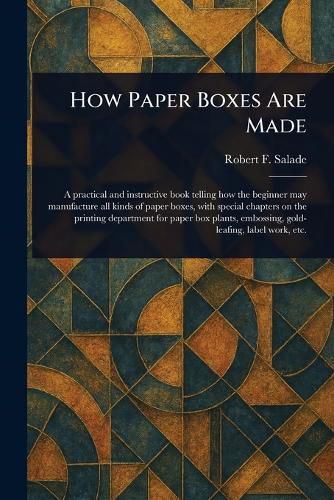Readings Newsletter
Become a Readings Member to make your shopping experience even easier.
Sign in or sign up for free!
You’re not far away from qualifying for FREE standard shipping within Australia
You’ve qualified for FREE standard shipping within Australia
The cart is loading…






This title is printed to order. This book may have been self-published. If so, we cannot guarantee the quality of the content. In the main most books will have gone through the editing process however some may not. We therefore suggest that you be aware of this before ordering this book. If in doubt check either the author or publisher’s details as we are unable to accept any returns unless they are faulty. Please contact us if you have any questions.
Explore the fascinating world of paper box manufacturing with Robert Francis Salade's "How Paper Boxes Are Made." This detailed look into the paper box industry offers a comprehensive understanding of the industrial processes involved in creating these essential packaging components.
Delve into the intricacies of box making, from material selection to the techniques of folding and assembly. Discover the manufacturing methods that were crucial to industries reliant on efficient and reliable packaging solutions. This book examines the practical aspects of industrial management and engineering within the context of paper box production.
Whether you are interested in the history of technology, the evolution of industrial processes, or the fundamentals of packaging, this volume provides valuable insights into a vital yet often overlooked aspect of manufacturing. A classic exploration of the paper box industry, meticulously prepared for print republication, offering timeless knowledge.
This work has been selected by scholars as being culturally important, and is part of the knowledge base of civilization as we know it.
This work is in the public domain in the United States of America, and possibly other nations. Within the United States, you may freely copy and distribute this work, as no entity (individual or corporate) has a copyright on the body of the work.
Scholars believe, and we concur, that this work is important enough to be preserved, reproduced, and made generally available to the public. We appreciate your support of the preservation process, and thank you for being an important part of keeping this knowledge alive and relevant.
$9.00 standard shipping within Australia
FREE standard shipping within Australia for orders over $100.00
Express & International shipping calculated at checkout
This title is printed to order. This book may have been self-published. If so, we cannot guarantee the quality of the content. In the main most books will have gone through the editing process however some may not. We therefore suggest that you be aware of this before ordering this book. If in doubt check either the author or publisher’s details as we are unable to accept any returns unless they are faulty. Please contact us if you have any questions.
Explore the fascinating world of paper box manufacturing with Robert Francis Salade's "How Paper Boxes Are Made." This detailed look into the paper box industry offers a comprehensive understanding of the industrial processes involved in creating these essential packaging components.
Delve into the intricacies of box making, from material selection to the techniques of folding and assembly. Discover the manufacturing methods that were crucial to industries reliant on efficient and reliable packaging solutions. This book examines the practical aspects of industrial management and engineering within the context of paper box production.
Whether you are interested in the history of technology, the evolution of industrial processes, or the fundamentals of packaging, this volume provides valuable insights into a vital yet often overlooked aspect of manufacturing. A classic exploration of the paper box industry, meticulously prepared for print republication, offering timeless knowledge.
This work has been selected by scholars as being culturally important, and is part of the knowledge base of civilization as we know it.
This work is in the public domain in the United States of America, and possibly other nations. Within the United States, you may freely copy and distribute this work, as no entity (individual or corporate) has a copyright on the body of the work.
Scholars believe, and we concur, that this work is important enough to be preserved, reproduced, and made generally available to the public. We appreciate your support of the preservation process, and thank you for being an important part of keeping this knowledge alive and relevant.